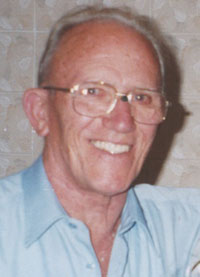27 November 2008 Edition
Fógraí bháis: DESSIE CARMICHAEL

BY LIAM SHANNON
IT WAS with great sadness that I learned of the death of my friend, Volunteer Dessie Carmichael on 31 October. I first met Dessie in the early 1960s when the Republican Movement was emerging from a particularly difficult time with the ending of the 1956-1962 campaign.
Like many young men at that time, we were tasked with rebuilding the Movement and trying to establish Sinn Féin’s reputation as a political organisation.
Born on 6 June 1934, Dessie worked in the Belfast area for a number of years before moving to Dublin where he continued his involvement with the Movement.
In 1966, a parade was organised to commemorate the 50th anniversary of the 1916 Easter Rising and the Dublin Brigade of Óglaigh na hÉireann decided to carry the brigade flag. The Garda had other ideas and made several attempts to confiscate the flag along the route, but to no avail. Although this encounter cost him a split head and a charge of assaulting several gardaí, for which he received six months in Mountjoy, Dessie said, “It was worth it.”
STAUNCH
Dessie came from a staunch republican family and loved all things Irish. Having been born and reared in Ardoyne, he was no stranger to the bigotry and injustice which prevailed at that time. His own father, Robert, was interned in the 1940s on the prison ship Argenta.
It was no surprise then that when the conflict broke out in 1969 Dessie returned immediately to help defend Ardoyne during those awful weeks which saw the burning of Farringdon Gardens and the surrounding streets.
As the war escalated, internment was reintroduced in August 1971. In October, Dessie who had come to the attention of the RUC Special Branch, was lifted at Newry as he travelled to the North with his future wife, Joan.
He was subjected to 48 hours of ritual beatings and interrogation at the hands of his RUC and British military captors before being interned in Crumlin Road Jail. He was moved to Cage 4 in Long Kesh in December where he spent the next eight months.
On his release, Dessie and Joan finally got time to get married and set up home in Dublin but, unfortunately, a short time later, Dessie was arrested and charged with explosives offences. After a lengthy trial he was found guilty and sentenced to four years in Portlaoise.
On his release over two years later, Dessie threw himself tirelessly into working on behalf of republican POWs.
His comrades in Dublin paid their own tribute to Dessie through the impressive guard of honour they organised at his funeral on 4 November. Joan and their daughter, Dearbhail, were very appreciative of the turn-out of Dublin republicans and I know Dessie would have been particularly proud of the dignified and disciplined manner in which the guard of honour carried itself.
In his moving graveside oration, Sinn Féin’s Alex Maskey described Dessie as “both an imp and a thoughtful, generous person”. This was reflected in the large number of people who attended the removal to the church and the funeral the following day. It was obvious that he had touched many people’s lives and, as one friend recalled: “Once he was a friend, he was a friend for life.”
‘40 SHADES OF RED’
Such was Dessie’s active involvement in republicanism and trade unionism that one of his comrades remarked that not only were their 40 shades of green present at his funeral but there was also 40 shades of red!
Dessie died in the care of the Bellevilla nursing home after a long and difficult illness, and although his physical voice was quietened his spirit remained as strong as ever. Great tributes were paid to the nursing staff and all who helped the family in their time of need.
On behalf of all his friends and comrades in Belfast and in the Republican Movement, I would like to pass on our deepest condolences to Dessie’s wife, Joan, and Dearbhail – the light of his life. Your loss is very much felt by all who knew him.
Slán, mo chara.
